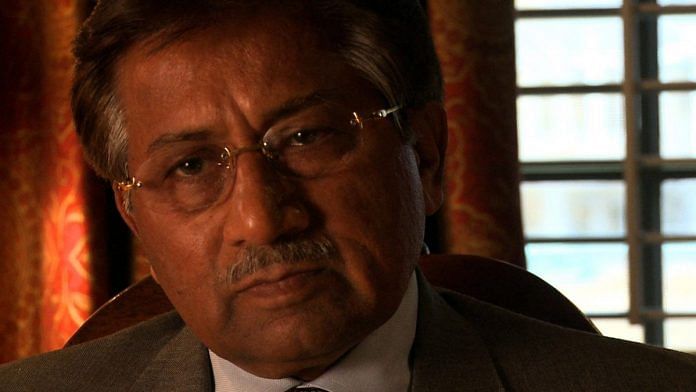New Delhi: The special court in Pakistan that awarded death sentence to former military ruler Gen Pervez Musharraf has directed that his corpse be dragged to Islamabad’s central square and hanged there for three days in case he dies before execution.
Finding him guilty of high treason, a three-judge bench of the court comprising Peshawar High Court Chief Justice Waqar Ahmad Seth, Justice Nazar Akbar of the Sindh High Court and Justice Shahid Karim of the Lahore High Court delivered the verdict Tuesday.
Passed with a 2:1 majority, the order asked law enforcement agencies to “strive their level best to apprehend the fugitive/convict and to ensure that the punishment is inflicted as per law and if found dead, his corpse be dragged to the D-Chowk, Islamabad, Pakistan and be hanged for 03 days”.
While Justice Seth and Justice Karim agreed with the death penalty, Justice Akbar wrote a dissenting note, opining that the prosecution had failed to prove their case.
The majority judgment convicted Musharraf citing Article 6 of the Constitution, which defines the offence of high treason.
It says: “Any person who abrogates or subverts or suspends or hold in abeyance, or attempts or conspires to abrogate or subvert or suspend or hold in abeyance the Constitution by use of force or show force or by any other unconstitutional means shall be guilty of high treason.”
According to the High Treason (Punishment) Act 1973, the punishment for high treason is death or life imprisonment.
The court also said all those who facilitated his escape “may also be brought in the net of due course of law and their criminal acts (if any) may be investigated and tried in accordance with law”.
Also read: Death penalty for Musharraf: Are Pakistan courts now too independent and free of pressure?
The treason trial
In 1999, Musharraf carried out a bloodless coup to oust the then prime minister Nawaz Sharif and came to power. In early November 2007, he declared an emergency and suspended the constitution, when he was the country’s President and Chief of Army Staff.
The treason case was filed against him in November 2013 by the Nawaz Sharif government. However, with strong backing of the army, Musharraf dodged trial for years and also managed to get Supreme Court permission in March 2016 to go abroad for medical treatment, promising to come back to his “beloved homeland” in a few weeks.
He has not returned to Pakistan since, though the special court have given him an opportunity several times to make his statement. He is currently in Dubai in the United Arab Emirates on a self-imposed exile.
The maze of legal proceedings
After the special court began hearing the case on a daily basis in October 2019, the entire prosecution team was sacked. The court concluded its proceedings on 19 November, in the absence of any further inputs from the prosecution or Musharraf’s lawyers.
The lawyers only sprung to action after the court’s announcement that it would be pronouncing the judgment on 28 November. While Musharraf’s team moved the Lahore High Court challenging the announcement, the government approached Islamabad High Court demanding that the special court be restrained from giving its judgment.
The Islamabad High Court then directed the special court to listen to all parties and ordered the government to appoint a prosecutor by 5 December. The special court, however, ruled that it was not bound by the Islamabad High Court judgment.
During the hearing on 17 December, Musharraf’s lawyer demanded that he be given an opportunity to make a statement before the court, while the prosecution demanded that the scope of the trial be widened by bringing in charges against some alleged collaborators of Musharraf, including former PM Shaukat Aziz.
Constitution desecrated several times, says court
The special court, however, rejected all these requests, noting that Musharraf had been granted several opportunities to join trial, and “afforded more than his due share of fair trial”.
It went on to lament that in Pakistan, “during 72 years of its independence, to our misfortune several times, the Constitutions framed by Legislative Bodies were desecrated”.
The court also passed strictures against Musharraf, saying he was given every opportunity to defend himself but he “by his conduct in the proceedings only evinced his utter contempt for the law and legal institutions in this country”.
It then held Musharraf guilty, ruling, “The trial of high treason is the requirement of the constitution against those individuals who undermine or attempt to undermine the Constitution by any means. This court after presentation of undeniable, irrefutable and unimpeachable evidence by the prosecution against the accused reaches to the conclusion that indeed Accused is guilty and deserves exemplary punishment.”
He was handed down death penalty, directing that he be “hanged by his neck till be dies on each count as per charge”.
Also read: Pakistan Army that gives ghaddari certificate doesn’t know what to do with traitor Musharraf



